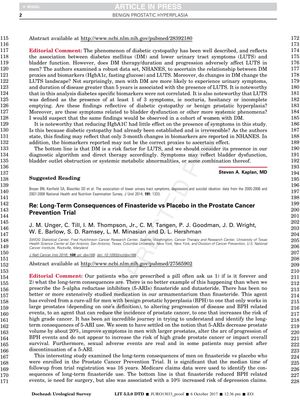Long-Term Consequences of Finasteride vs Placebo in the Prostate Cancer Prevention Trial
October 2017
in “
The Journal of Urology
”

TLDR Finasteride reduces the need for prostate surgery but may increase the risk of depression and persistent sexual side effects.
The document discusses the long-term consequences of finasteride compared to placebo in men enrolled in the Prostate Cancer Prevention Trial, with a median follow-up time of 16 years. Finasteride was found to reduce benign prostatic hyperplasia (BPH) related events, such as the need for surgery, but was also associated with a 10% increased risk of depression claims. The study utilized Medicare claims data, which may have biases based on diagnosis coding. Despite these limitations, the data provide valuable information for patients regarding the expectations of taking 5-alpha reductase inhibitors (5-ARIs) like finasteride. The document also emphasizes the importance of discussing the potential for sexual adverse events, including ejaculatory dysfunction and loss of libido, which are real concerns and may persist even after discontinuation of the medication. An extensive meta-analysis of more than 17,000 men in 17 randomized clinical trials for BPH or androgenic alopecia (AGA) indicated that sexual adverse events were statistically significant in men with BPH compared to placebo, but not in those with AGA. The impact of these medications on sexual function may be underestimated.




